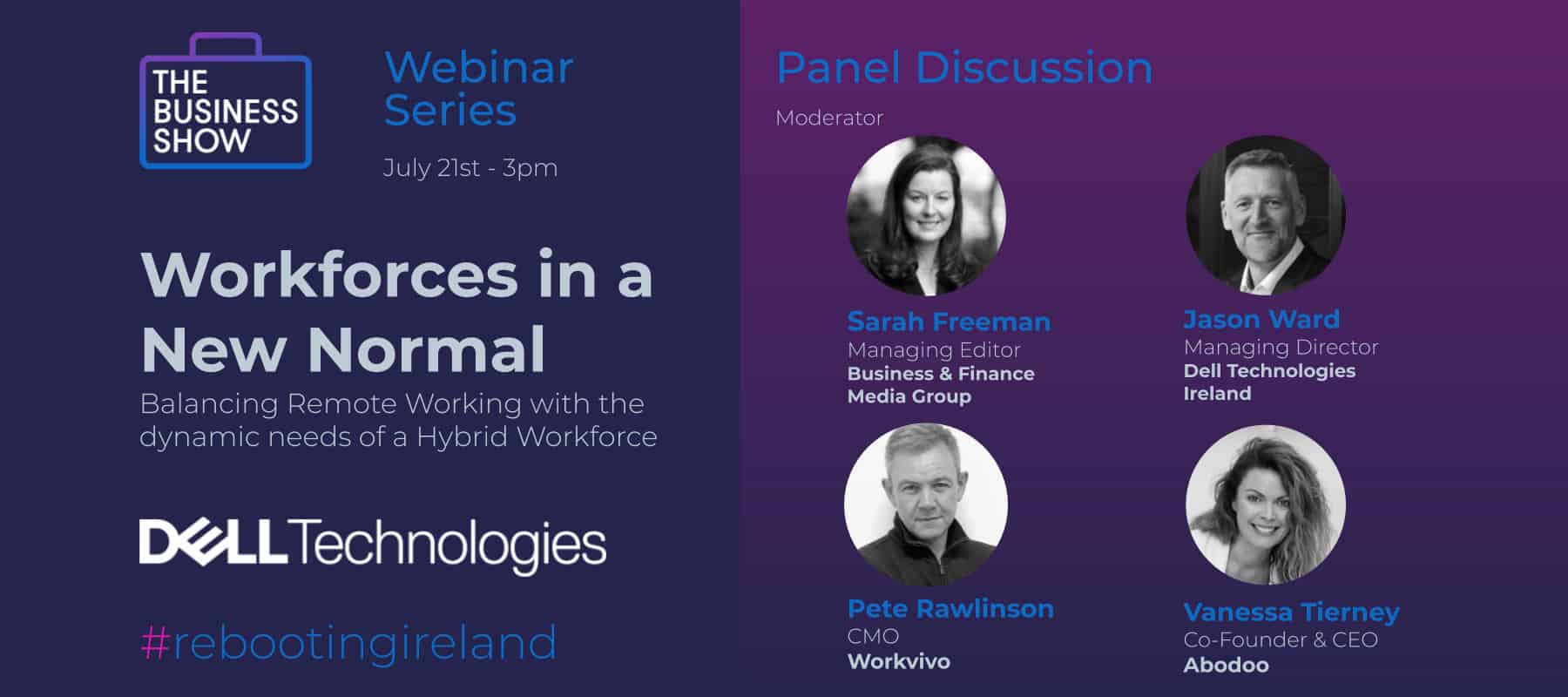The five key takeaways are:
-
- A hybrid workforce must not make people feel disconnected
- A hybrid workforce implicitly contains the potential for greater diversity
- Ireland can position itself as the ultimate location for talent in the coming months
- The responsibility of making a hybrid workforce successful is incumbent on all levels of business
- A company’s policy, culture and attitude to remote working needs to be established
‘Workforces in a New Normal: Balancing Remote Working with the dynamic needs of a Hybrid Workforce’ was the theme discussed in yesterday’s The Business Show webinar by guest panellists Jason Ward, Managing Director, Dell Technologies Ireland, Vanessa Tierney, CEO & Co-Founder Abodoo, and Pete Rawlinson, CMO Workvivo.
This second webinar in The Business Show webinar series was hosted by Sarah Freeman, Managing Editor of Business & Finance Media Group.
If you missed the webinar, you can watch it here.
Here are five key takeaways from the webinar:
- A hybrid workforce must not make people feel disconnected
Pete Rawlinson, CMO of Workvivo, spoke about the importance of catering to the needs of different people in the move to a hybrid working environment. He said: “My point of dealing with different psychologies, as people work in a distributed way, one thing that is missing from the way that people interact, either between themselves and their leadership or themselves and the business, is that face-to-face interaction that is of a more personal nature.”
He stressed the importance of making individuals in the workplace feel a sense of belonging or being a part of something bigger, even if they are working from home. While easier to achieve in an office environment, measures must be taken to ensure the people who thrive off such an atmosphere do not feel disconnected from the larger aims of the business.
- A hybrid workforce implicitly contains the potential for greater diversity
Responding to Mr. Rawlinson’s points, Jason Ward, Managing Director of Dell Technologies Ireland, discussed the great opportunity that lay ahead in diversifying an employee base in a hybrid workforce: “Proximity to site,” he said, “where you go to office, is no longer a challenge. For us, and in Ireland where we face massive challenges with housing, and the cost of living in Dublin, when you think about a company like Dell with 6000 people, we can now look to the whole island to very remote urban areas and employ people.”
- Ireland can position itself as the ultimate location for talent in the coming months
Elaborating on Mr. Ward’s points, Vanessa Tierney, CEO and co-founder Abodoo, recalled speaking to a large tech company in San Francisco: “They said how companies, the ‘big brands’, are slowly coming to the realisation that the cost of being in San Francisco is astronomical. If you need someone with cyber-security skills or software development skills, you’re going to start looking outside of San Francisco, and then maybe outside of America. What’s the next country? It’s Ireland.”
Ms. Tierney continued by saying that we have an opportunity to position our country as the ultimate location for talent – whether companies decide to land here or not no longer matters.
- The responsibility of making a hybrid workforce successful is incumbent on all levels of business
Pete Rawlinson discussed how the responsibility of making a hybrid workforce successfully is incumbent on “Employees, leadership, and especially middle management.” He said: “Employees have had to experience this first hand because they have been thrust into this experience, but then so has that middle management layer. They’re probably the least equipped to deal with this as well as leading the team. Let’s not assume that leadership knows how to do this, because there is no rule book for it. We have to be cognisant of that.”
- A company’s policy, culture and attitude to remote working needs to be established
Vanessa Tierney discussed how companies’ attitudes towards remote working need to change: “[Remote working] needs to be promoted. Having worked with big brands the last few years, a lot of them were very ‘hush, hush’ about their smart working policy – ‘get someone in, get them through their probation, and if the manager likes them and they perform well and we trust them, we might give them two days at home a week.’ That can no longer be the case.”






